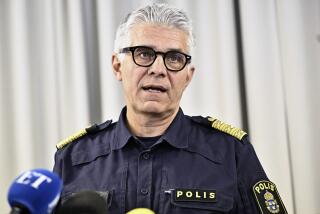Sweden Uneasy Over Failure to Solve Palme’s Assassination
- Share via
STOCKHOLM — The clump of roses on the busy Stockholm sidewalk seems a modest memorial to Sweden’s best-known statesman and late prime minister, Olof Palme.
But in the months since last Feb. 28, when an assassin’s bullet killed Palme as he walked home from a movie theater with his wife, countless thousands of Swedes have come to stare at the flowers that mark the spot where their prime minister fell.
Palme’s widow, Lisbet, once asked that the flowers be removed, but they quickly reappeared, and despite the severe winter cold, Swedes continue to come to this place. Usually they look first at the flowers and the small, unframed snapshot of Palme that has been placed among the blossoms, then they gesture up the alley where the assassin fled into the night.
“It’s become a kind of pilgrimage with religious overtones,” Roland Nordlund, who heads a Swedish government department that charts public morale, told a recent visitor.
National Pride Wounded
Nordlund and others who monitor the public mood in Europe’s fourth-largest country see the pilgrimage as part of a struggle to come to terms with the assassination. This is a nation that once viewed political violence as a disease of other societies and took pride in the fact that its leaders could move about freely and unprotected.
Many believe that Sweden’s chances of returning to its open society hinge on catching Palme’s assassin.
“As long as we have no answer to the question of who would want to kill our prime minister, we don’t know what conclusions we should draw from this as a nation,” said Claes Zeime, Stockholm’s chief public prosecutor and the man responsible for the Palme murder investigation. “We need to succeed.”
There is a growing feeling here that the prospects for success may be gradually fading. The biggest manhunt ever mounted in Sweden has produced no murder weapon, no obvious motive, no prime suspect and few hard leads.
As the hunt goes on, Stockholm Police Chief Hans Holmer, who is personally directing a task force of 150 detectives assigned to the case, has replaced Palme as Sweden’s most controversial citizen.
From the beginning, Holmer, 56, has driven his team relentlessly. He even insisted that regular staff meetings be convened on Christmas Eve and Christmas Day.
Holmer has openly clashed with two prosecutors over tactics. For months he has maintained doggedly that he is 95% certain that he knows who carried out the killing.
So far, however, he has been unable to piece together the puzzle.
Discussions of Holmer’s conduct generate a level of emotion that the normally stoic Swedes once reserved for debates about Palme’s unconventional style.
Last month, when a popular Swedish current events program voted Holmer “Swede of the Year,” editors were careful to note that the choice was in recognition of his prominence rather than an endorsement of his work.
He receives cakes, flowers, photos and gifts so luxurious that some must be returned. But praise for his dedication is matched by criticism that he has become so obsessive that he has lost his perspective.
“The man needs a vacation,” Karin Ahrland, the head of Parliament’s Judicial Committee, said not long ago.
Not long ago, Holmer, dressed casually and slouching in a chair at police headquarters, brushed aside such criticism. He insisted that he was neither tired nor discouraged about the lack of progress.
“If you are a policeman, you must have patience and a fighting spirit,” he said. “You can’t give up.”
Setback in Case
His comments followed the latest setback in the case. After months of careful groundwork, Holmer’s detectives recently carried out a series of pre-dawn raids throughout Stockholm, detaining several individuals linked to a Kurdish extremist organization in what seemed to be a major breakthrough. The capital crackled with excitement as the police announced plans for a news conference.
The sense of anticipation was fueled by police leaks hinting that investigators had found reasons why the radical Kurdish Workers Party, known as the PKK, would want to kill Palme.
Although Sweden had granted asylum to a limited number of PKK members and thousands of other Kurds fighting for a homeland in the Middle East, Palme had refused to allow the party’s leader, Abdullah Ocalan, into Sweden, had labeled the PKK a terrorist organization and had committed Sweden to improving relations with the PKK’s principal enemy, Turkey.
But it took only a few hours of questioning before investigators were forced to release three suspects for lack of evidence.
“There simply was no reason to keep them,” said Zeime, the chief prosecutor.
Holmer, upset that the prosecutor released the three so quickly, vowed to pursue the Kurdish theory, but it seemed clear that he would be forced to devote more manpower to other possibilities.
The only other serious suspect, a 33-year-old Swedish member of American extremist politician Lyndon H. LaRouche Jr.’s European Labor Party, who Holmer believed had a special hatred for Palme’s Socialist policies, was released last March after a week of questioning.
The absence of any clear leads in the case has heightened speculation among Swedes, many of whom have their own theories about who killed their prime minister.
Those mentioned, usually within the framework of an elaborate plot, include right-wing neo-Nazi groups or ultra-left radicals, the Soviet KGB or the American CIA, Palestinian terrorist Abu Nidal, the Swedish Security Police and the Church of Scientology.
Until the assassin is caught, many Swedes believe that such theories will proliferate, reducing the prospect of any return to their much-valued open society.
Security around Palme’s successor as prime minister, Ingvar Carlsson, is said to be tighter than for any Swedish leader in the present century. Carlsson has given up his suburban villa for a central Stockholm apartment, reportedly for security reasons, and last June he canceled a visit to Peru because of concern for his safety.
Other changes have taken place. Parliamentary debate has been noticeably more subdued since Palme’s killing, and while there is little visible hostility toward the country’s 400,000 resident foreigners, there is a sense that immigration policy should be studied more closely.
“People feel we must be more careful, that we’re not an island and must protect our values,” Nordlund, the man who charts morale, said. “Swedes have become more Swedish.”
More to Read
Sign up for Essential California
The most important California stories and recommendations in your inbox every morning.
You may occasionally receive promotional content from the Los Angeles Times.













